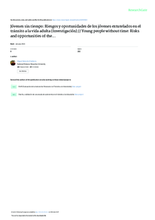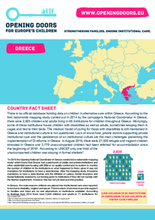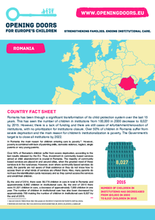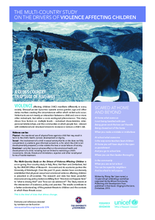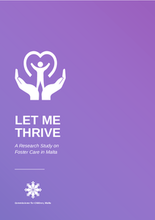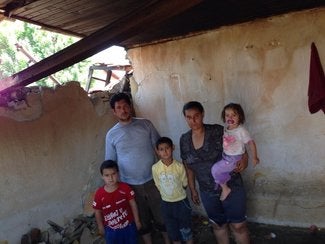

Displaying 361 - 370 of 527
Lumos, an international non-profit organisation founded by J.K. Rowling to help countries reform their services for disadvantaged children, has begun working with partners in Greece to help bring about reforms for institutionalised children. Lumos hosted a conference in Athens supporting deinstitutionalisation in Greece which was attended by over 70 policymakers, children’s welfare professionals, and civil society delegates.
The objective of this study was to develop and test an instrument to measure self-representation of youths in residential care in Portugal.
La presente investigación trata de los jóvenes sin tiempo y cómo trabajar, con ellos y ellas, en un tránsito inclusivo a la vida adulta, especialmente jóvenes que han pasado una parte importante de sus vidas en recursos residenciales del sistema de protección y que cuando son mayores de edad deben dejarlos para salir a la vida adulta, en un tránsito cargado de complejidades.
This fact sheet provides an overview of the numbers of children in institutional care in Greece.
The Transformative Monitoring for Enhanced Equity (TransMonEE) Database, established in 1992 by the UNICEF Innocenti Research Centre, captures a vast range of data relevant to social and economic issues relevant to the situation and wellbeing of children, young people and women in Eastern Europe and Central Asia. The 2016 database includes data on children in alternative care for Eastern and Central Europe and Central Asia, as well as data on child protection, social protection, and other topics.
As of this Fact Sheet, Serbia has no comprehensive deinstitutionalization strategy.
This study is a snapshot of a multi-country study involving Italy, Peru, Viet Nam, and Zimbabwe of how individual characteristics, interpersonal relationships, and the communities in which people live interact with institutional drivers to increase or reduce a child’s risk of violence.
This chapter from Global Perspectives is a discussion of child protection, care, welfare, and residential care in Greece. This chapter covers a brief historical overview of the child protection and care situation in Greece, as well as a discussion of care and protection of children in contemporary Greece. There is a case study included of “The Smile of the Child” foundation.
In this chapter of Global Perspectives, Jorge F. del Valle and Amaia Bravo discuss the history and state of residential child care in Spain including the transitions that occurred in the 1980s and 1990s. They also discuss types of residential care programs and qualifications of residential care staff. Del Valle and Bravo review recent literature in the area and discuss current challenges in Spanish residential care.
This is an article discussing a research study performed to determine the best forms of out of home care for children.

